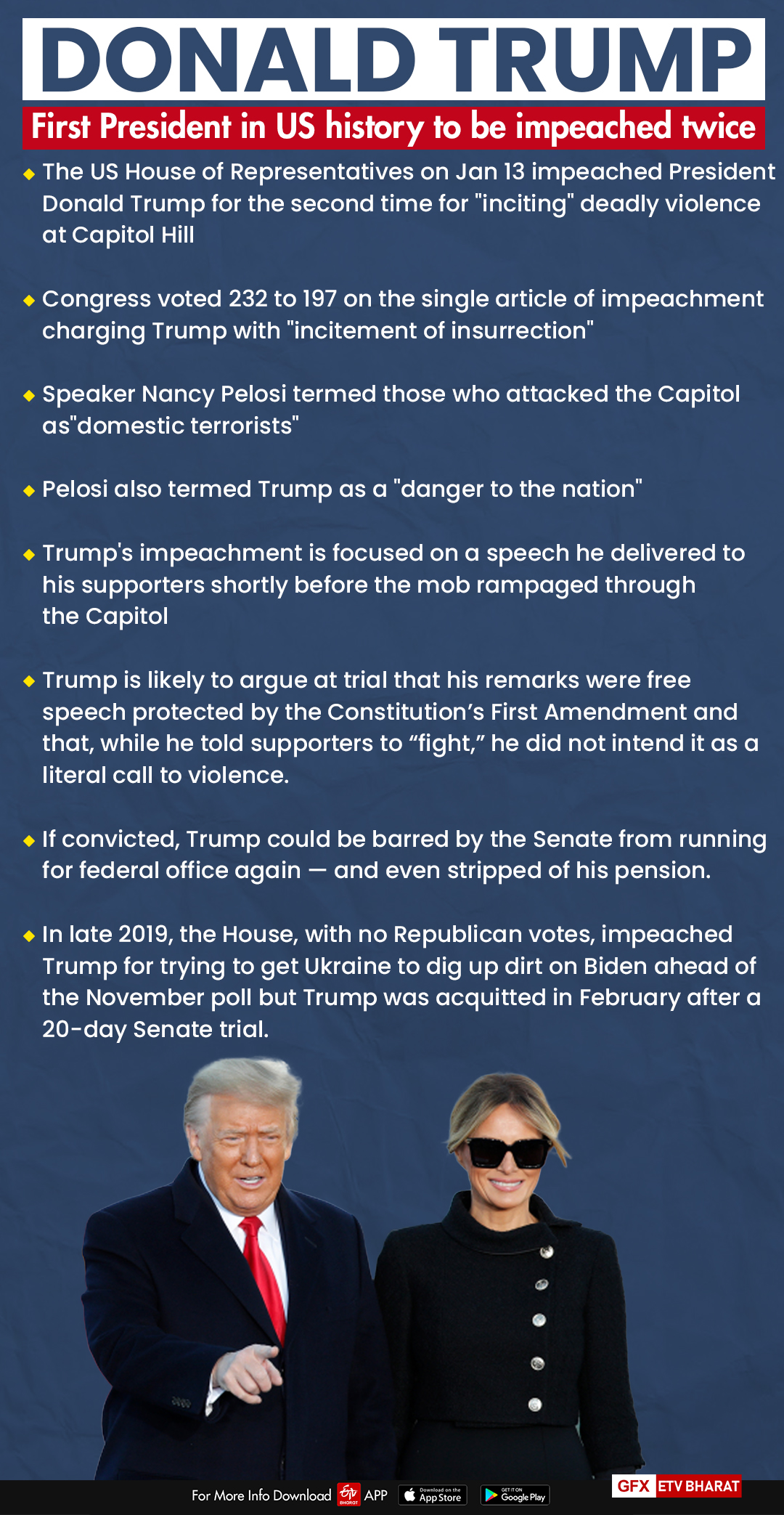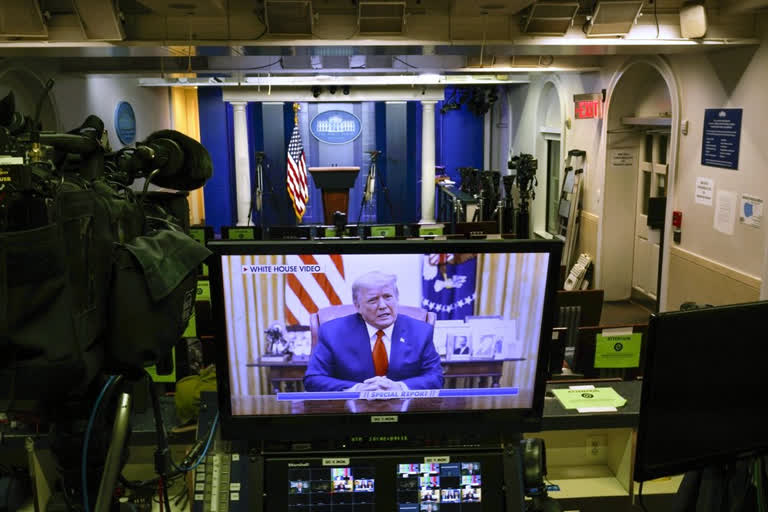Washington: President Donald Trump might argue the calendar is his friend when it comes to a second impeachment trial.
Trump’s impeachment last week by the House of Representatives for his role in inciting the riot at the U.S. Capitol set up his trial in the Senate. But there’s one potential wrinkle.
In 2019, the last time Trump found himself impeached by the House, he had nearly a year left in his presidency. But after the inauguration of Joe Biden on Wednesday, Trump is out of office by the time any Senate trial gets started.

Some Republican lawmakers argue it’s not constitutional to hold an impeachment trial for a former President, but that view is far from unanimous. Democrats for their part appear ready to move forward with a trial.
On Tuesday, Sen. Joni Ernst, R-Iowa, said she doesn’t think a post-presidency impeachment trial is constitutional. But Sen. John Cornyn, R-Texas, wasn’t so sure.
“I think there are serious questions about it,” he said.
Connecticut Democrat Richard Blumenthal, meanwhile, said it was “bogus” that a trial after Trump leaves office wouldn’t be constitutional, noting that the Senate has held impeachment trials of federal judges after they’ve resigned.
“So whether somebody resigns, or runs out the clock it makes no difference. They can still be held accountable and there’s nothing in the spirit or the letter of the impeachment provisions in the Constitution that argues against it,” he said.
Some questions and answers about whether a former president can be impeached.
- Why is this open to debate?
The Constitution says: “The President ... shall be removed from Office on Impeachment for, and Conviction of, Treason, Bribery, or other high Crimes and Misdemeanors.”
But the Constitution says nothing about the impeachment of a former President. The question has also never come up. The only other two Presidents to be impeached, Bill Clinton and Andrew Johnson, were tried while still in office.
- What do scholars and history have to say on the topic?
A recent Congressional Research Service report for federal lawmakers and their staffs concluded that while the Constitution’s text is “open to debate,” it appears most scholars agree that a president can be impeached after leaving office. One argument is that state constitutions that predate the U.S. Constitution allowed impeachment after officials left office. The Constitution’s drafters also did not specifically bar the practice.
Still, the text of the Constitution could be read to suggest impeachment only applies to current officeholders. In the early 19th century, one influential Supreme Court justice, Joseph Story came to that conclusion.
One powerful suggestion that post-office trial is acceptable, however, comes from history. The Congressional Research Service report cites the 1876 impeachment of Secretary of War William Belknap. Belknap resigned over allegations he received kickbacks. The House impeached him after his resignation, and while Belknap objected to being tried in the Senate because he’d left office, the Senate heard three days of arguments on the topic and then deliberated in secret for over two weeks before concluding Belknap could be tried. He was ultimately acquitted.
- Could Trump challenge a conviction?
Courts are unlikely to want to wade into any dispute over impeachment. In 1993, in a case involving an impeached former judge, the Supreme Court ruled it had no role to play in impeachment disputes because the Constitution says the “Senate shall have sole Power to try any impeachments.”
- Does an impeachment trial of a former President present other legal issues?
One other issue is who would preside at the impeachment trial of an ex-president. The Constitution says it’s the chief justice’s job to preside at the impeachment trial of a president. But scholars offer differing views about whether that’s Chief Justice John Roberts’ job if Trump’s trial begins after he’s out of office.
The choices for who would preside appear to be Roberts, Vice President Kamala Harris, or Sen. Patrick Leahy, D-Vt., who will be the Senate’s president pro tem.
- What's the point of impeaching someone who is out of office?
The consequence of the Constitution sets up for a President who is impeached and convicted is removal from office. That’s not a concern for a former President. Still, the conviction would send a message about Trump’s conduct. Moreover, if the Senate were to convict, lawmakers would presumably take a separate vote on whether to disqualify Trump from holding future office. Some lawmakers believe that’s appropriate.
“We need to set a precedent that the severest offence ever committed by a president will be met by the severest remedy provided by the Constitution — impeachment and conviction by this chamber, as well as disbarment from future office,” incoming Senate majority leader Chuck Schumer, D-NY, said Tuesday.
Here are some key highlight points following Donald Trump's second impeachment trial:
Different Charges, different impeachment
This impeachment trial is likely to differ from the last one in many ways.
The House charges in 2019 on Trump’s dealings with the president of Ukraine, whom he urged to investigate Biden, came after a lengthy investigation and testimony from multiple government officials. While Democrats unanimously criticized the conduct and charged Trump with abuse of power, the charges wove together a complicated web of evidence.
This time, Democrats felt there was little need for an investigation — the invasion of the Capitol played out on live television, and most members of Congress were in the building as it happened.
The senators who will be sitting there are not just observers, they were victims of this same crime like the rest of us were.
Trump’s speech beforehand, in which he told his supporters to “fight like hell” against the election results, was also televised as Congress prepared to officially count the votes.
House Intelligence Committee Chair Adam Schiff, who led the last House impeachment team, said the insurrection at the Capitol was an “impeachable offence committed in broad daylight, in which the whole country was a witness.”
He said the lightning-fast impeachment “was required by the exigency of the circumstances, and also made possible by the very nature of the crime.”
The Article
The four-page article of impeachment says that Trump “gravely endangered the security of the United States and its institutions of Government.”
It was introduced by Democratic Reps. David Cicilline of Rhode Island, Ted Lieu of California and Jamie Raskin of Maryland, all of whom have been tapped to serve as impeachment managers in the Senate trial.
The article says Trump’s behaviour is consistent with his prior efforts to “subvert and obstruct” the results of the election and references his recent call with the Georgia secretary of state, in which he said he wanted him to find him more votes after losing the state to Biden.
As per reports, Trump has falsely claimed there was widespread fraud in the election, and the alleged baseless claims have been repeatedly echoed by congressional Republicans and the insurgents who descended on the Capitol.
As the protesters broke in, both chambers were debating GOP challenges to the electoral vote count in Arizona as part of the process for certifying Biden’s election win.
Trump’s likely defence in Senate trial
The House approved a single article of impeachment — a formal charge — accusing Trump of “incitement of insurrection,” focused on a speech he delivered to thousands of supporters shortly before the pro-Trump mob rampaged through the Capitol.
Trump is likely to argue at trial that his remarks were free speech protected by the Constitution’s First Amendment and that, while he told supporters to “fight,” he did not intend it as a literal call to violence.
Trump released a videotaped statement on Wednesday, shortly after the impeachment vote, saying he condemned last week’s violence. “Violence and vandalism have no place in our country and no place in our movement,” Trump said.
Trump's future deeply uncertain
Trump has left Washington with his future deeply uncertain, two weeks after his supporters sent lawmakers and congressional staffers scrambling for safety as they tried to halt the peaceful transition of power. While Trump was once expected to leave office as the most powerful voice in the Republican Party and the leading contender for its 2024 nomination, he has been shunned by much of the party over his response to the violence, which left five people dead, including a Capitol Police officer.
Trump is expected to be joined in Florida by a handful of aides as he mulls his future.
What will he do next?
Trump has yet to outline plans for his post-presidency, from establishing an office to selecting a site for a potential presidential library. Trump has held open the door to running for the White House again in 2024, but the Senate could shut it as soon as next week when it begins Trump’s second impeachment trial.
If convicted, Trump could be barred by the Senate from running for federal office again — and even stripped of his pension.
What is certain for now is that the impeachment trial will be held for sure as the Democrats are all set to take control of the Senate. But it’s still unclear exactly how the trial will proceed and if any Senate Republicans will vote to convict Trump.
(with inputs from agencies)
Read:| Trump returns to a business empire ravaged by pandemic



